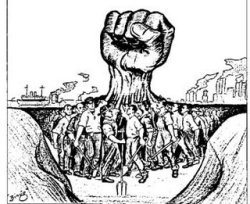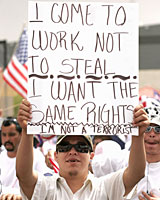Cocaine sà ¿cómo no?
A couple months ago, Drug War Chronicle ran an interesting story on developments for the Bolivian coca farmers since Evo Morales, a former cocalero union leader, took political office. Things are much better than they were in the days of U.S.-backed forced eradication. But times are still hard in the Chapare:
For more than two decades beginning in the early 1980s, various Bolivian governments working at the behest of the United States government embarked on a policy of forced eradication of coca crops in Bolivia’s Chapare, a lowland region in the state of Cochabamba. It was a time of strife and conflict, human rights violations and peasant mobilizations as tens of thousands of families dependent on the coca crop fought with police and soldiers, blocked highways, and, eventually, coalesced into a powerful political force that helped topple governments. Now, with a Chapare coca growers’ union leader, Evo Morales, sitting in the presidential residence in La Paz, times have changed and the days of a US-imposed
zero cocapolicy are history.Under US-imposed legislation adopted in 1988, Law 1008, only peasants in the traditional coca growing region of the Yungas were allowed to grow coca, and total coca production was limited to 30,000 acres. But that did not stop peasants from growing coca in the Chapare, where, in the early 1980s, production had boomed during the
cocaine coupyears of Gen. Luis Garcia Mesa. The development of coca production in this non-traditional, non-allowed area was the most significant target of US-backed forced eradication efforts throughout the 1990s and the beginning of this decade.… The change actually began in 2004, before Morales was elected president, when then-President Gonzalo Sanchez de Lozada signed an accord with coca growers (or cocaleros) aligned with the Six Federations of the Coca Growers of the Tropics of Cochabamba allowing each family to grow one cato (1,600 square meters — about the size of one third of a football field) of coca.
But as part of a broader policy of
coca, si; cocaine, noadopted by Morales since he took office just over a year ago, the Bolivian government has in effect turned its back on the 30,000-acre legal production limit, now formally allowing an additional 20,000 acres in the Chapare to be cultivated with coca. But while such measures have brought peace to the region, it remains mired in poverty and desperation, as Drug War Chronicle saw during a visit there this week.On a small plot of land near Villa Tunari in the Chapare, peasant farmer Vitalia Merida grows coca, along with oranges and bananas, in an effort to feed and clothe her seven children. Times are tough, she said.
My kids don’t want to go to school for economic reasons,she told the Chronicle.They want to go and make money.Her oranges and bananas bring only a pittance, she said, while her cato of coca allows her to pocket about $75 month, gaining her about $900 a year — close to the average income in Bolivia, one of South America’s poorest countries.Despite the constant struggle to earn an income, said Merida, a former Six Federations leader (and still a member), life is better than in the days of forced eradication.
We are still poor, but we are free now,she said.It is peaceful now. Before, we waited for the soldiers to come like bandits. They killed us, they took us prisoners.… While campesinos like Vitalia Merida are struggling, the Morales government is attempting to ease their plight. Part of that effort revolves around helping them get their crop to market. In a coca warehouse just outside nearby Shinahota, cocaleros are drying and weighing the crop in preparation for transport to legal markets in Bolivian cities.
This is our local crop,said Six Federations member Felix Cuba at the warehouse.Under this new program, we are able to sell direct to the cities without middlemen. This means a little more money for us,he told the Chronicle.And it keeps the coca out of the hands of the narcos.
With all due respect to Sr Morales and Sr Cuba, that seems like an awful lot of trouble for a set of government programs that are doing only a little to help out poor cocaleros. Perhaps there may be simpler solutions to the difficult problem of how to lift rural coca farmers out of grinding, and sometimes desperate poverty.
For example, why not just back the hell off and let them sell cocaine?
I hear you can make some money at that.


